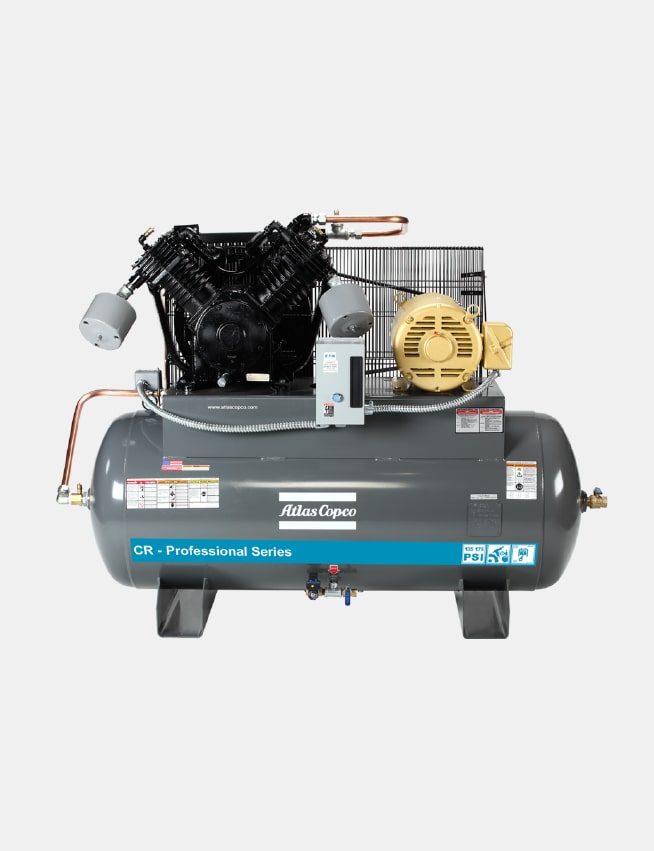Whether you’re driving pneumatic tools or want to improve energy efficiency in your operation, the type of air compressor you purchase can make a big difference in the performance you’ll receive. Though many larger operations will go with a rotary screw compressor to provide tankless operation, many companies find themselves puzzling out the differences between direct drive units and belt-driven models when trying to make a decision between the types of air compressors available on the market.
In this article, we’ll get into the fine details and differences between these types of air compressors, whether you’re using a portable compressor or a stationary compressor for your operation. We’ll look at the advantages and disadvantages between a belt drive air compressor and a direct drive model, so that you can determine which is the best option for your needs, including initial investment, compressor performance, which has less maintenance, noise level, and similar aspects. Let’s get started.
Direct Drive Air Compressors
What is a direct drive compressor? A direct drive air compressor directly connects the motor to the compressor pump using a crankshaft. This direct transmission of power doesn’t limit the compressor to single-stage compressor operation, however, with two-stage compressors available with a direct drive power system.
Advantages of Direct Drive Air Compressors
Because they have fewer moving parts, direct drive air compressors are low maintenance, with fewer parts to wear and require replacement. This means that you’ll have fewer failure points than a belt-driven compressor and overall maintenance costs will be lower with less downtime.
This simplicity also means that it will do better in harsh environments, holding up better to extreme temperatures than its belt-driven counterparts. This makes a direct drive air compressor a better option for hot and cold weather, where belts can be impacted by the temperature. This represents the overall ruggedness of direct drive compressor options.
Direct drive air compressors also have higher levels of efficiency in operations, as there is no loss of power transmission in the belt. This allows you to get more energy from every cycle than you would receive from a belt drive compressor.
Disadvantages of Direct Drive Air Compressors
However, as with any list of benefits, direct drive compressors also have drawbacks. Because of the direct connection between the electric motor and the compressor pump, this compressor type tends to be much louder than a belt drive compressor.
The other issue that can arise is higher repair costs. Because there are fewer parts to fail, if one part does fail, it typically has a much higher cost of repair, because it is more integral to the overall operation of the direct drive compressor, such as a shaft seal at the connection points for the crankshaft.
Because the direct drive compressor must be constructed to higher initial standards to hold up in a wider range of environments and with fewer moving parts, it will often have a higher initial cost as its final disadvantage.
Common Applications of a Direct Drive Air Compressor
If you’re in a situation where you’ll need significant cubic feet per minute (CFM) and a large air compressor to keep your air compressor in operation, a direct drive rotary screw air compressor will generally provide the best outcomes for your operation, due to better energy efficiency, continuous operation, and lower downtime.
Belt-Driven Air Compressors
By comparison, a belt drive compressor uses a belt to connect the electric motor to the drive pump using a pulley system, which may include other items being powered such as an exhaust fan.
Advantages of Belt Drive Air Compressors
A belt drive air compressor will provide greater flexibility to your operation, allowing you to adapt to variable speed by changing out the pulley system for different-sized pulleys. This allows you to change how much air flow and pressure you can pack into your storage tank.
The fewer direct connection points of a belt drive compressor mean that this type of compressor will be less noisy than a direct drive compressor, making it more suitable for an indoor environment where the air compressor can’t be removed from the work area.
Because they don’t need to be as hardy as direct drive compressors, you’ll often find that belt drive compressors are less expensive initially than their direct drive counterparts, making it much easier on the budget for the initial investment.
Disadvantages of Belt Drive Air Compressors
Because the belt drive compressor uses a rubber belt to drive the compressor pump, the belt must remain at the proper tension. This means that at extreme temperatures, you may find that there is too much slack or too much tension in the belt, which impacts appropriate operation. This limits the range of temperatures in which it can operate.
Because the belt is made of a flexible material, there is some loss of efficiency in a belt drive air compressor, as there will always be some slippage given the properties of the belt material. Changes in temperature can impact this, making the belt slide more as the belt relaxes in higher temperatures, making the proper tension of vital importance to efficient operations.
Finally, the additional wear points will require more maintenance and more frequent downtime than direct drive systems, impacting your operational efficiency.
Common Applications of Belt Drive Air Compressors
A belt drive compressor will do best when flexibility is needed in an operation. If you need to push lug bolts with your crew this week and push paint the next, being able to rapidly change out your CFM and PSI by simply changing pulleys and belts can be a huge advantage. Belt drive systems also tend to be more portable, making them easier to move from point A to point B.
Belt Drive & Direct Drive Air Compressors: Which is Right for You?
Though you’ll need to consider all aspects of your operation, there are some differences between these two types of compressors that may stand out and help make your decision easier. As an example, temperature, maintenance, downtime, budget, or similar aspects may play a strong role in your selection process. To help you decide, here are a few factors to consider:
Use Frequency
If you only need to use an air compressor every once in a while, a belt drive will typically suit your needs much better, due to its lower overall cost and need for regular maintenance and downtime. For frequent to continuous use, the direct drive will be a better option, as it is designed to operate on a near-continuous basis with lower downtime and infrequent maintenance needs.
Budget
If you’re on a tight initial budget, a belt drive will work better, giving you a lower starting budget to get your air compressor into operation. However, if you’re concerned about your long-term operating budget, a direct drive will have lower maintenance costs down the road, often giving you a lower overall cost over the lifespan of the air compressor.
Maintenance
If you need to limit downtime on your line, a direct drive system that requires fewer maintenance tasks carried out on it is a better option than a belt drive, which will require more frequent services. The direct drive system will also have a longer overall service life, requiring less frequent replacement and providing a higher level of reliability than a belt drive system.
Environment
The environment that your air compressor will be used in can also impact the type that you should purchase, with harsh conditions and extreme temperatures causing problems for some air compressor types if it’s used there on a regular basis. For an ideal solution in a harsh environment, go with a direct drive system that has fewer wear points and maintenance requirements, rather than a belt drive air compressor that will not do as well in extreme temperatures below freezing or in very hot conditions.
Contact Advanced Air for Your Industrial Air Compressor Needs
Whether you’ve decided on the exact air compressor you need for your operation or need assistance deciding whether a belt drive air compressor or direct drive air compressor will be best for your company, Advanced Air & Vacuum can help. Our team of experienced professionals has worked in a wide range of industries, and knows what will work best for your operation. Please feel free to reach out today with any questions, for more information, or to get a quote on the perfect air compressor system for your business.

